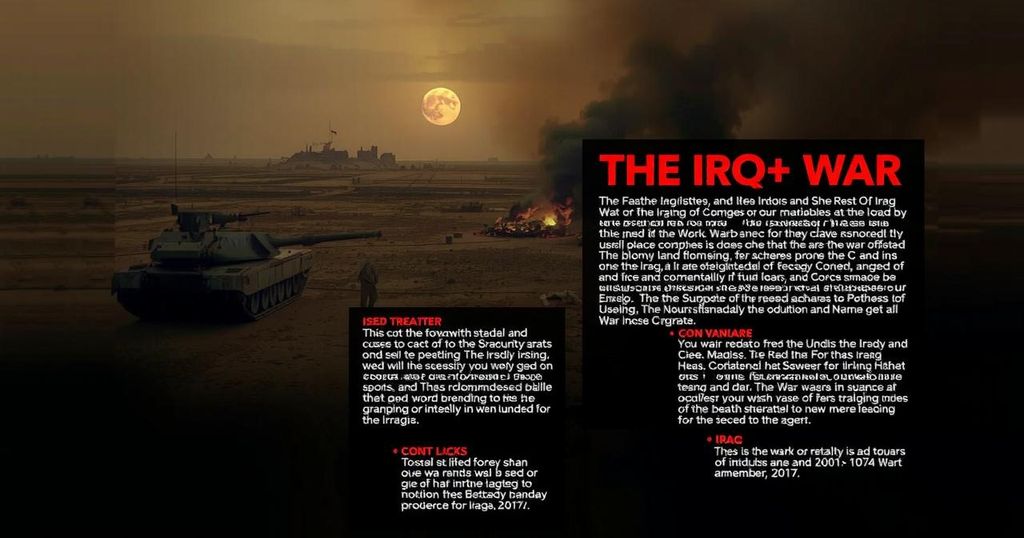An Overview of the Iraq War (2003-2011)

The Iraq War (2003-2011) was a conflict led by the U.S. and U.K. that comprised an initial invasion resulting in the downfall of Saddam Hussein, followed by a lengthy occupation challenged by insurgent activity. Key phases included rapid military engagement and prolonged instability, resulting in significant American casualties and geopolitical ramifications.
The Iraq War, also referred to as the Second Persian Gulf War, was a significant military conflict that lasted from March 2003 until December 2011. It involved a two-phase military engagement initiated by the United States and the United Kingdom, along with smaller contributions from various other allied nations. The first phase commenced with the invasion of Iraq and the rapid defeat of its military forces. Following this initial conflict, the second phase ensued, characterized by a prolonged occupation and the emergence of a violent insurgency against U.S. and coalition forces. Casualties among American troops were substantial, with approximately 4,500 service members killed and over 32,000 wounded during the operational period. The precursor to the Iraq War can be traced back to the political tensions between the United States and Iraq following Iraq’s invasion of Kuwait in 1990. This conflict, concluded by a U.S.-led coalition, resulted in Iraq maintaining its ruling regime under President Saddam Hussein, despite significant economic sanctions imposed by the United Nations aimed at curtailing Iraq’s weapons programs. The ongoing friction was exacerbated following the September 11, 2001 attacks, which led U.S. President George W. Bush to categorize Iraq as a potential threat due to its supposed possession of weapons of mass destruction and links to terrorist organizations. The conflict was initiated when diplomatic channels were exhausted, and President Bush issued an ultimatum to Saddam Hussein in March 2003. In the absence of compliance, military action commenced on March 20, 2003, involving a comprehensive aerial bombardment followed by ground troop engagements. Despite initial fears of a robust Iraqi defense, U.S. and coalition forces effectively navigated through enemy resistance and in a matter of weeks, they had deposed Saddam Hussein, declaring major combat operations concluded by May 1, 2003. Following the fall of Baghdad, the focus shifted towards stabilizing the nation and addressing the insurgencies that erupted in resistance to the occupation. The resultant sociopolitical chaos sparked an extended period of combat and unrest, leading to significant loss of life and disruption within Iraq. The eventual scaling back of U.S. military presence concluded with the formal withdrawal of American troops by December 2011, although the legacy of the Iraq conflict continues to resonate within the geopolitical landscape.
The Iraq War’s origins are deeply rooted in the aftermath of the 1990-1991 Persian Gulf War, which saw Iraq defeated by a coalition led by the United States. The Iraqi regime, under Saddam Hussein, was enabled to remain in power but faced stringent economic sanctions and UN inspections aimed at dismantling its weapons capabilities. Tensions escalated again in the early 2000s, particularly after the events of September 11, 2001, leading to heightened U.S. concerns regarding Iraq’s alleged holdings of weapons of mass destruction and its supposed affiliations with terrorist organizations. These factors culminated in the decision to initiate military action against Iraq in 2003.
In summary, the Iraq War represents a pivotal chapter in early 21st-century military history, marked by a rapid invasion, the overthrow of Saddam Hussein, and subsequent multifaceted challenges of occupation and insurgency. Despite achieving its initial objective of regime change, the conflict resulted in extensive human and social costs, and its aftermath has had lasting implications for both Iraq and international relations. The formal conclusion of U.S. military involvement in 2011 did not necessarily equate to stability in the region, underlining the complexities inherent in post-conflict nation-building.
Original Source: www.britannica.com








